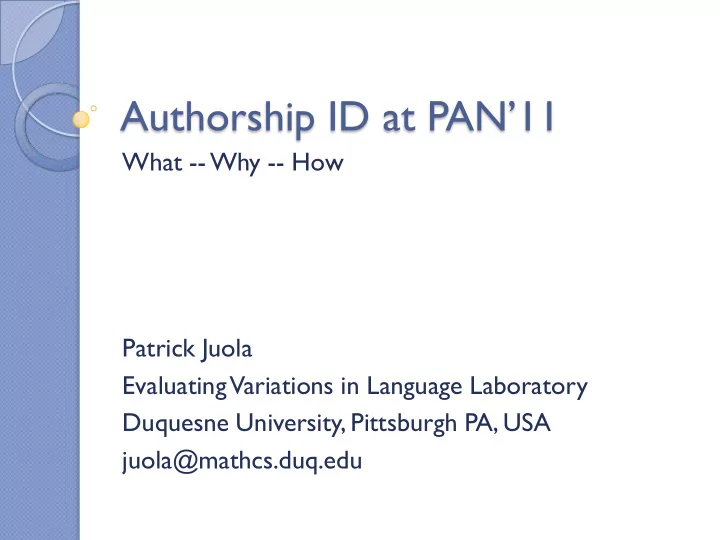

Authorship ID at PAN’11 What -- Why -- How Patrick Juola Evaluating Variations in Language Laboratory Duquesne University, Pittsburgh PA, USA juola@mathcs.duq.edu
Authorship Identification ◦ … needs little definition among this group ◦ Differs subtly from plagiarism detection Plagiarism : This part and THAT part differ ID : This part is by THAT person ◦ But, yeah, still the same problem
Authorship Identification ◦ … needs little motivation among this group, either School essays Forged or disputed documents Poison-pen letters (or Email) Anonymous or corporate authorship ◦ Lots of reasons to study
… and lots of ways to do it Something of a “professional ad-hocracy” My own system (JGAAP) implements more than 1 million different approaches, most of which “work” … and none of which work perfectly
Hence, this track/lab NSF funded to create “community resources” to evaluate proposed methods NSF funded to create evaluation framework – i.e. on behalf of the NSF, welcome
This track : Email authorship Why one track? Possible better results from drilling down. Possible ability to re-use analysis; e.g. is one stemmer “better” than another? Why Email? Lots of data, and lots of importance. ◦ If we had suggested a track on the Paston letters, who would have come?
Structure : 5 subtasks Closed class : 26 authors Closed class : 72 authors Open class : 26 authors Closed class : 72 authors Verification : 1 author at a time
Participants 31 registered groups /13 submissions8 Scored by averaging precision, recall, and F score “Winners” : ◦ LudovicTanguy (University of Toulouse & CNRS, France) ◦ IoannisKourtis (University of the Aegean, Greece) ◦ Mario Zechner (Know-Center, Austria) ◦ Tim Snyder (Porfiau, Canada)
… but the real winner is the field … and everyone who participated ◦ … or observed … or is motivated to start looking further at this We hope to be back with an improved lab next year based on feedback here We hope to see you all back here with improved technology based on feedback here I look forward to seeing the papers!
Questions for next time New corpus, or extended corpus? Standardized markup? What languages/genres? What evaluation scheme? What other changes?
Dankuwel!
Recommend
More recommend